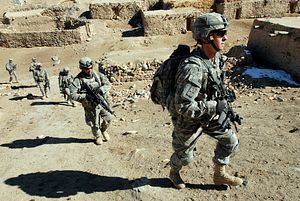While the Islamic State and Ukraine are prominently featured on the agenda at NATO’s 2014 summit in Wales, taking place this Thursday and Friday, the issue of Afghanistan looms large as well. The end of 2014 represents the deadline for U.S. and NATO troops to leave the country although both entities are attempting to negotiate a security agreement that would allow for a residual date beyond the end of this year. NATO began negotiations for a Status of Forces Agreement (SOFA) late last year with the Afghan government. Afghan President Hamid Karzai refused to conclude that agreement or signed the Bilateral Security Agreement (BSA) with the United States, claiming that the responsibility should fall on his successor. Afghan’s presidential election ran into several issues earlier this summer after a run-off election that was marred by vote-rigging and corruption, prompting a lengthy and controversial audit.
In Wales this week, the 28 members of NATO got nowhere when it came to determining troop numbers for a post-2014 training and assistance force in Afghanistan. According to Defense News, several NATO members are waiting on approval from the Afghan government before they come forward with any troop numbers. “We are in the process now of generating our forces for the training mission to be established by [Jan. 1], 2015,” NATO Secretary-General Anders Fogh Rasmussen told a press conference on Thursday. It is likely that a 5,000 strong NATO force will supplement a U.S. residual force of around 10,000 next year.
The two candidates in Afghanistan’s run-off presidential election, Ashraf Ghani and Abdullah Abdullah, await the results of a controversial audit. Abdullah has repeatedly threatened to boycott the audit, further delaying the announcement of a result. Despite Afghanistan’s electoral delays, both candidates view both the SOFA and BSA positively. According to Rasmussen, Ghani and Abdullah collaboratively sent a letter to NATO ahead of the summit “indicating that they will do all they can to reach a political agreement.” Additionally, Afghan Defense Minister Bismillah Khan Mohammadi reassured U.S. Defense Secretary Chuck Hagel that “both presidential candidates continue to support a BSA,” according to Pentagon Press Secretary Navy Rear Adm. John Kirby.
Both the U.S. and NATO had realistically planned to have an agreement in hand by the end of the summer. Given delays, the logistics of managing a withdrawal and setting up a residual force may grow increasingly challenging. Despite his optimism, Rasmussen also noted in Wales this week that Afghanistan has little time remaining to resolve its presidential election stalemate, emphasizing that there will come a point when the U.S. and NATO will have no other choice but to plan for a complete withdrawal. Without the SOFA and BSA, neither entity has a legal basis for maintaining any troops in Afghanistan as of January 1, 2015.

































